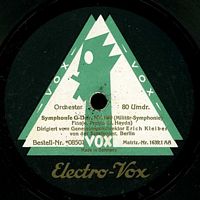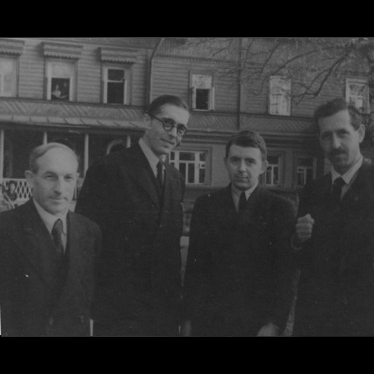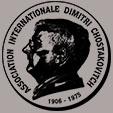Étiquette : Wolf
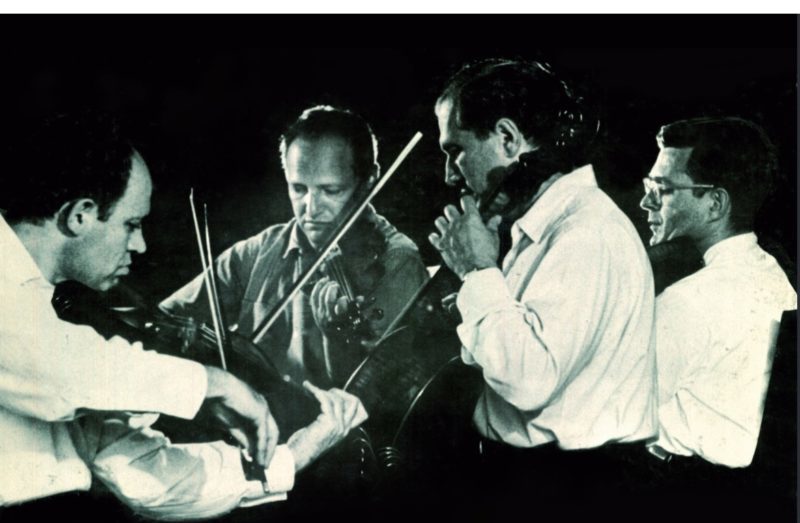
Johannes Brahms Klarinettenquintett Op. 115
Reginald Kell, Clarinet
Fine Arts Quartet (Leonard Sorkin, Abram Loft, Violin; Irving Ilmer, Viola; George Sopkin, Cello)
Enregistrement/Recording: 1957
Hugo Wolf Italienische Serenade
Fine Arts Quartet (Leonard Sorkin, Joseph Stepansky, Violin; Irving Ilmer, Viola; George Sopkin, Cello)
Enregistrement/Recording: 1953/1954
Source: Bande/Tape – 2 pistes 19cm/s / 2tracks 7.5 ips STEREO
Concertapes 25-4 (Brahms) & 22-4 (Wolf)
Cet enregistrement du Quintette de Brahms Op.115 n’a pas été réédité depuis 1995, et celui de la Sérénade de Wolf ne l’a pas été depuis sa première parution dans les années cinquante. Ce sont donc des raretés discographiques.
Le Fine Arts Quartet a été fondé en 1940 par quatre musiciens du Chicago Symphony Orchestra (CSO), à savoir Leonard Sorkin (1916-1985), Bernard Senescu (1904-1968), Sheppard Lehnhoff (1905-1978) et George Sopkin (1914-2008). En raison de la guerre et de la conscription, le quatuor n’a pu commencer à donner régulièrement des concerts qu’à partir de 1946, avec un nouveau deuxième violon, Joseph Stepansky (1916-1984). En 1952, l’altiste Sheppard Lehnhoff a quitté le quatuor pour réintégrer le CSO et a été remplacé par Irving Ilmer (1919-1997) qui à son tour a été remplacé en 1963 par Gerald Stanick, puis en 1968 par Bernard Zaslav. En 1954, Joseph Stepansky a été remplacé par Abram Loft (1922-2019). Il n’y aura plus de changement jusqu’en 1979 avec le départ d’Abram Loft et de George Sopkin. Leonard Sorkin a quitté le quatuor en 1982 pour être remplacé par Ralph Evans, qui en est toujours le premier violon.
De 1946 à 1954, le Fine Arts Quartet a participé à des émissions radiophoniques hebdomadaires le dimanche matin pour l’ ‘American Broadcasting Company’ (ABC) de Chicago. ainsi qu’à des émissions éducatives télévisées. Il était également un pionnier de l’enregistrement stéréo. Avec le label Webcor (Webster Chicago Corporation), à l’origine un fabricant de magnétophones, puis Concertapes, le label qui a été fondé par le Fine Arts Quartet et lui appartenait, ce qui était rare à l’époque, le Quatuor a réalisé tous ses enregistrements en stéréo à partir de 1953 (notamment Dvorak Op.96 ‘Américain’ et Debussy), avec en 1958 une Intégrale très remarquée des quatuors de Bartók. Un certain nombre de ces enregistrements ont été réédités en 2016 (téléchargement HD), mais ni le Quintette de Brahms, ni la Sérénade d’Hugo Wolf. n’en faisaient partie, alors qu’on y trouvait le Quintette K.581 de Mozart, que Kell a également enregistré en 1957 avec le Fine Arts Quartet, ce qui laisse supposer que la bande originale du Brahms était en mauvais état au point de n’avoir pas pu être copiée. Les Quintettes de Mozart et de Brahms de 1957 ont été les tous derniers enregistrements de Kell, après quoi, il est retourné en Grande-Bretagne en janvier 1958.
Reginald Kell (1906-1981) a enregistré trois fois le Quintette Op.115 de Brahms: le 10 Octobre 1937, avec le Busch Quartet (Abbey Road – Studio n°3), une version mono avec le ‘Fine Arts Quartet of the American Broadcasting Company’ pour American Decca (New York – 2 au 5 Octobre 1951), réédité par DGG dans le coffret de 6CD ‘Reginald Kell the complete ‘American Decca’ recordings’ (00289 477 5280), et enfin, en 1957, le présent enregistrement stéréophonique pour Concertapes, publié sur bandes et en microsillon. Sa dernière publication en microsillon date de 1978 (Concert Hall SMS 2530), et il n’y eut qu’une seule édition en CD, en 1995 (Boston Skyline SD 135), ‘à partir de copies de première génération des bandes originales, conservées par M. Sopkin’.
Dans le numéro du printemps 1999 de l’International Classical Record Collector (ICRC), dans un article sur Reginald Kell, Norman C. Nelson a écrit à propos de cet enregistrement : ‘Le Quintette de Brahms avec les Fine Arts présente l’inconvénient apparemment insurmontable d’être précédé par la version incandescente avec le Quatuor Busch. Ce qui est surprenant, après la formidable impression laissée par l’enregistrement précédent, c’est l’excellence de l’interprétation des Fine Arts, qui présente un jeu plus actif et plus vivant que pour le Quintette de Mozart. L’intensité n’est cependant pas aussi soutenue que dans l’enregistrement avec les Busch, qui tient l’auditeur à la gorge de la première à la dernière note. Le rubato appliqué par Kell dans les premiers passages de clarinette du Quintette est similaire dans les deux enregistrements, bien qu’une vingtaine d’années les séparent. Les deux interprétations avec le Fine Arts restent de belles interprétations dans lesquelles Kell démontre sa maîtrise de l’instrument et son talent artistique unique à la fin de sa carrière d’enregistrement. Seule une légère diminution de la concentration de son timbre est perceptible. Le son du dernier enregistrement est nettement supérieur à celui des deux premiers, en particulier le Brahms de 1937, et certains pourraient même préférer le jeu des cordes plus moderne des Fine Arts au style plus ancien des Busch, qui comprend de nombreux cas de « portamento ».
La Sérénade de Wolf fait partie des quelques enregistrements réalisés par Webcor en 1953 ou 1954, avant que Joseph Stepansky ne soit remplacé par Abram Loft. Webcor l’a publié sur une bande mono (2922-4). La bande stéréo (22-4), publiée en 1956 par Concertapes, mentionne de manière erronée Abram Loft en tant que deuxième violon.
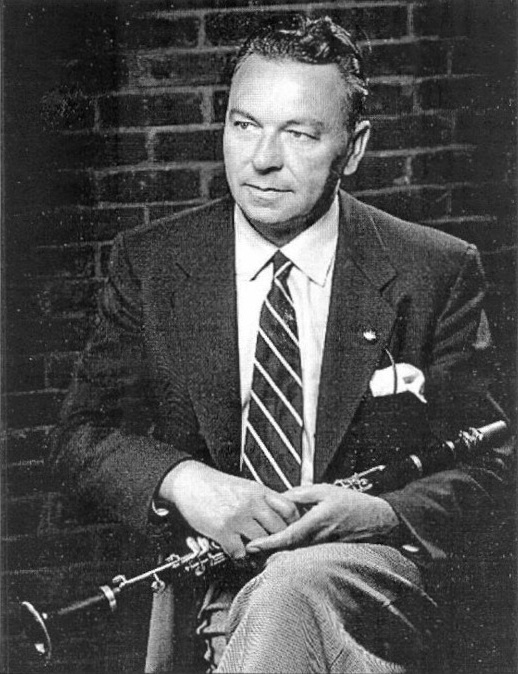
Reginald Kell
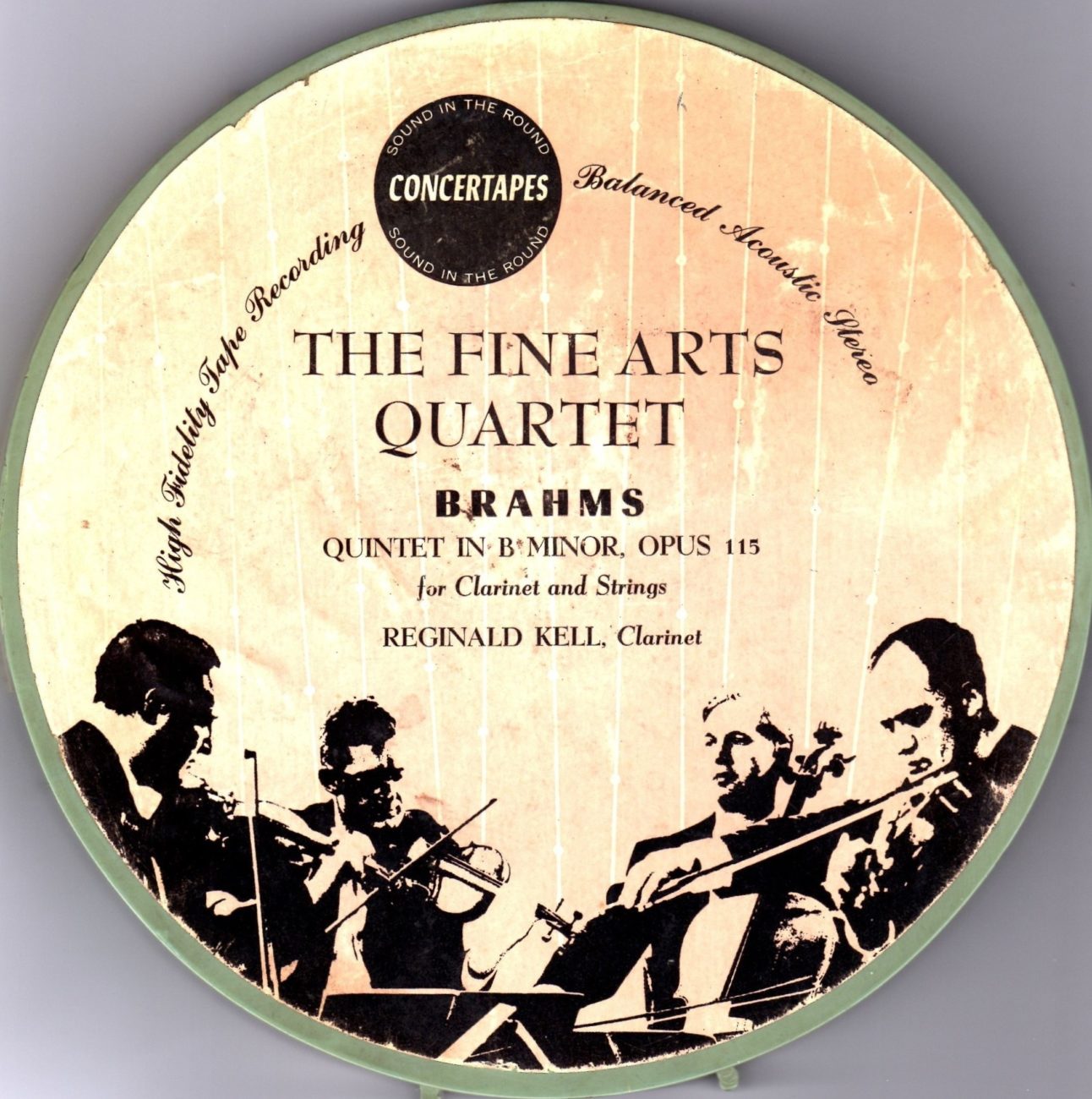
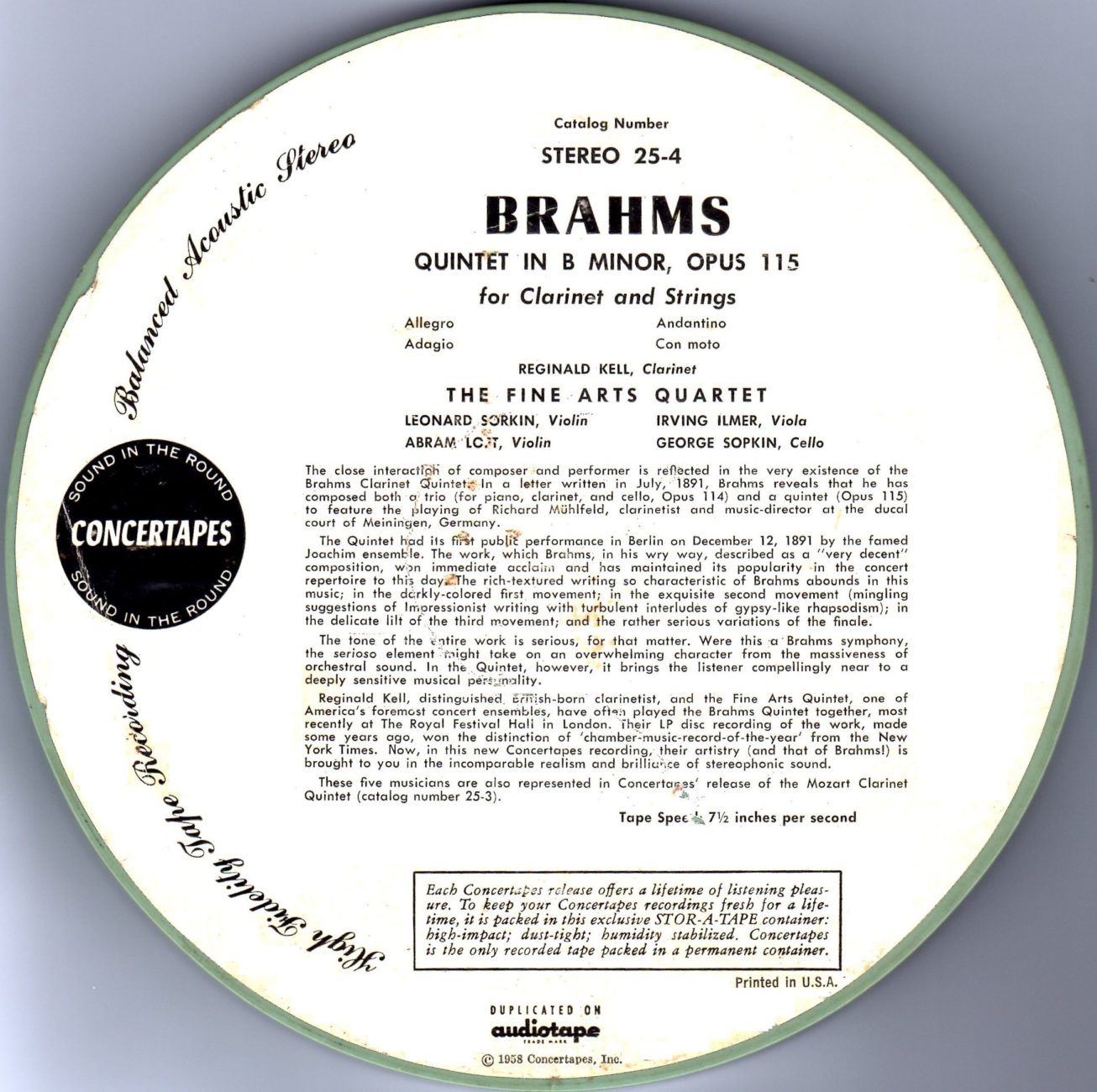
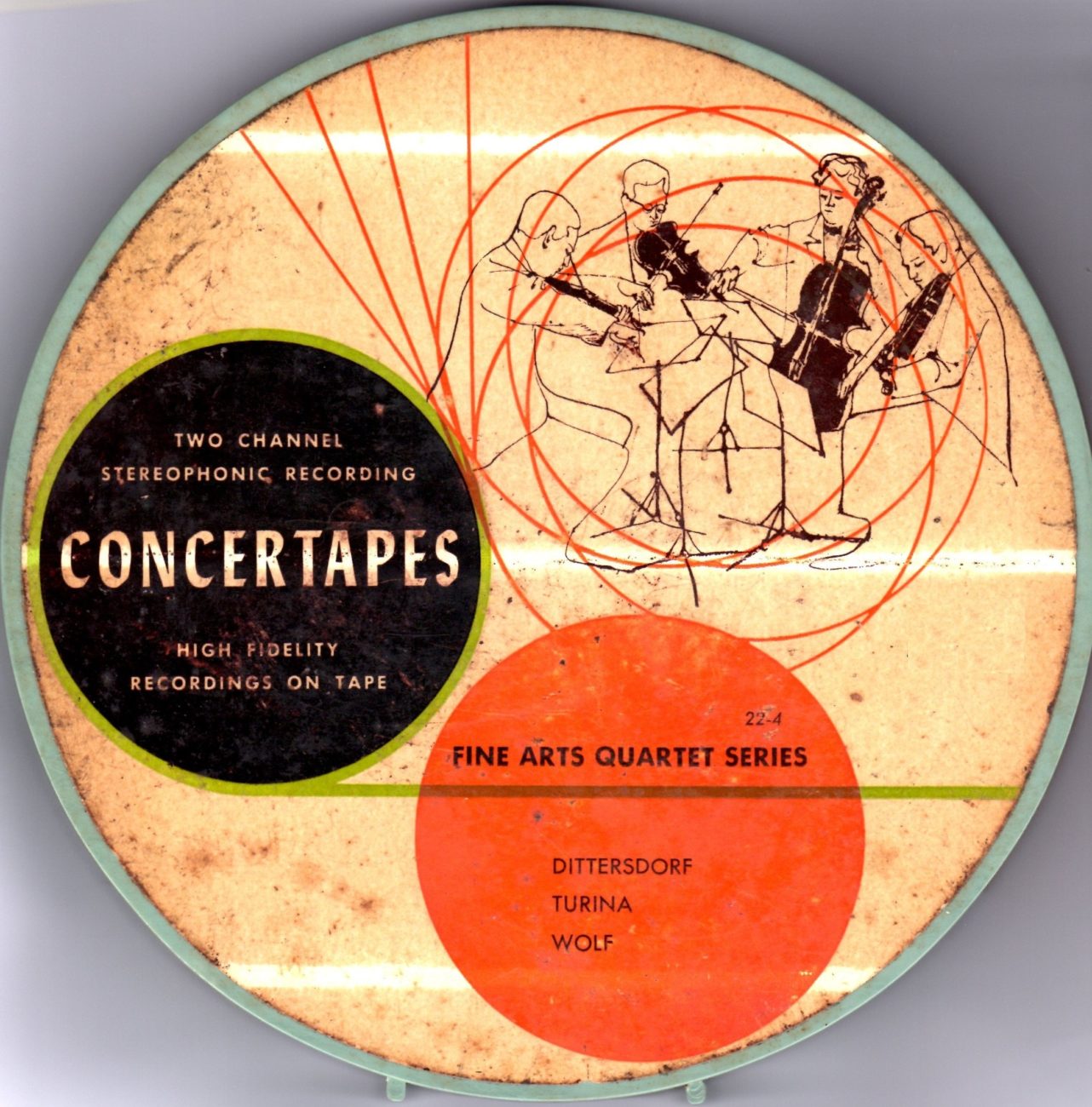
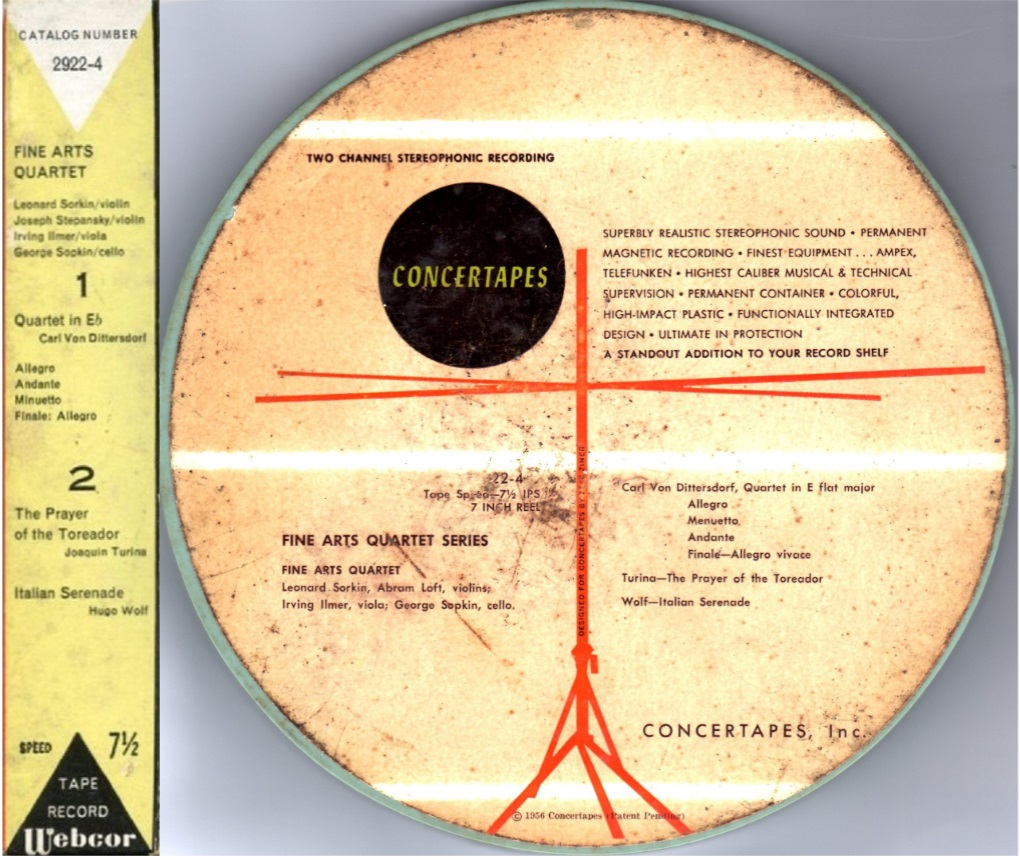
The 1957 recording of the Brahms Quintet Op.115 has not been reissued since 1995, and that of the Wolf’s Serenade has not been reissued at all since its first release in the 1950s. They are therefore discographic rarities.
The Fine Arts Quartet was founded in 1940 by four musicians from the Chicago Symphony Orchestra (CSO): Leonard Sorkin (1916-1985), Bernard Senescu (1904-1968), Sheppard Lehnhoff (1905-1978) and George Sopkin (1914-2008) . Because of the war and conscription, the quartet was unable to begin giving regular concerts until 1946, but with a new second violinist, Joseph Stepansky (1916-1984). In 1952, violist Sheppard Lehnhoff left the quartet to rejoin the CSO and was replaced by Irving Ilmer (1919-1997), who in turn was replaced in 1963 by Gerald Stanick, then in 1968 by Bernard Zaslav. In 1954, Joseph Stepansky was replaced by Abram Loft (1922-2019). There were no further changes until 1979 with the departure of Abram Loft and George Sopkin. Leonard Sorkin left the quartet in 1982 to be replaced by Ralph Evans, who is still first violin.
From 1946 to 1954, the Fine Arts Quartet took part in weekly Sunday morning radio broadcasts for Chicago’s American Broadcasting Company (ABC), as well as educational television programmes. He was also a pioneer of stereo recording. With the Webcor label (Webster Chicago Corporation), originally a manufacturer of tape recorders, and later Concertapes, the label which was founded by and belonged to the Fine Arts Quartet, which was quite rare then, the Quartet made all his recordings in stereo from 1953 onwards (notably Dvorak Op.96 ‘Américain’ and Debussy), with a highly acclaimed complete recording of Bartók’s quartets in 1958. A number of these recordings were re-issued in 2016 (‘Hi-Res’ download), but neither the Brahms Quintet nor the Hugo Wolf’s Serenade were included, although they did include Mozart’s Quintet K.581, which Kell also recorded in 1957 with the Fine Arts Quartet, which probably means that the master tape of the Brahms was in poor condition to the point of being unplayable. The 1957 Mozart and Brahms Quintets were Kell’s last recordings, after which he returned to Britain in January 1958.
Reginald Kell (1906-1981) made three recordings of Brahms’s Quintet Op.115: on 10 October 1937, with the Busch Quartet (Abbey Road – Studio No. 3), a mono version with the ‘Fine Arts Quartet of the American Broadcasting Company’ for American Decca (New York – 2 to 5 October 1951), reissued by DGG in the 6CD box set ‘Reginald Kell the complete ‘American Decca’ recordings‘ (00289 477 5280), and finally, in 1957, the present stereophonic recording for Concertapes, issued on tape and LP. It was last released on LP in 1978 (Concert Hall SMS 2530), and there has only been one CD release, in 1995 (Boston Skyline SD 135), ‘from first-generation studio masters, preserved by Mr Sopkin’.
In the Spring 1999 Issue of International Classical Record Collector (ICRC), in an article on Reginald Kell, Norman C. Nelson wrote about this recording: ‘The Brahms Quintet with the Fine Arts is at the apparently unsuperable disadvantage of being preceded by the incandescent version with the Busch Quartet. What is surprising, after the terrific impression made by the earlier recording, is the excellence of the Fine Arts performance, which features more urgent, vivid playing than their Mozart Quintet. The intensity, however, is not as sustained as in the Busch recording, which has the listener by the throat from first note to last. The rubato applied by Kell in the opening clarinet passages of the Quintet is similar in both recordings though some 20 years separated them. Both performances with the Fine Arts remain lovely ones in which Kell demonstrates his continuing grip on the instrument and unique artistry at the close of his recording career. Only a slight diminution in the focus of his tone is noticeable. The sound on the last recording is clearly superior to their early counterparts, especially the 1937 Brahms, and some may even prefer the more modern string playing of the Fine Arts to the older style of the Buschs, which includes numerous instances of portamento’.
Wolf’s Serenade is one of the few recordings made by Webcor in 1953 or 1954, before Joseph Stepansky was replaced by Abram Loft. Webcor released it on a mono tape (2922-4). The stereo tape (22-4), published in 1956 by Concertapes, incorrectly lists Abram Loft as second violin.
Les liens de téléchargement sont dans le premier commentaire. The download links are in the first comment

